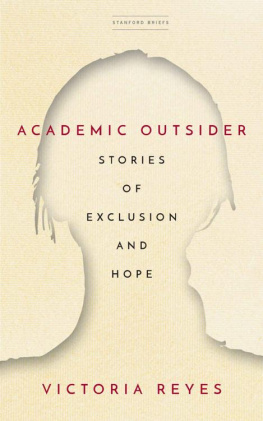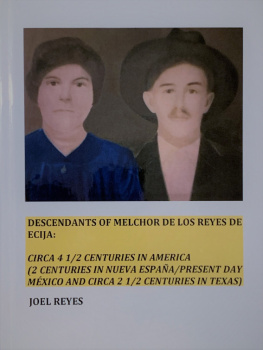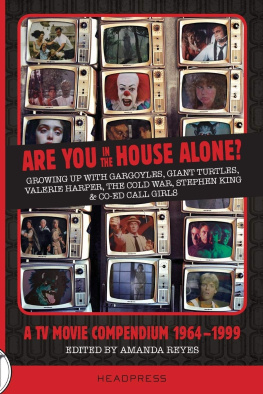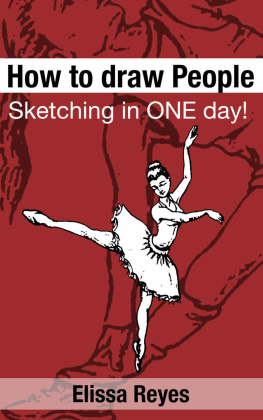Victoria Reyes - Academic Outsider
Here you can read online Victoria Reyes - Academic Outsider full text of the book (entire story) in english for free. Download pdf and epub, get meaning, cover and reviews about this ebook. year: 2022, publisher: Stanford University Press, genre: Politics. Description of the work, (preface) as well as reviews are available. Best literature library LitArk.com created for fans of good reading and offers a wide selection of genres:
Romance novel
Science fiction
Adventure
Detective
Science
History
Home and family
Prose
Art
Politics
Computer
Non-fiction
Religion
Business
Children
Humor
Choose a favorite category and find really read worthwhile books. Enjoy immersion in the world of imagination, feel the emotions of the characters or learn something new for yourself, make an fascinating discovery.
- Book:Academic Outsider
- Author:
- Publisher:Stanford University Press
- Genre:
- Year:2022
- Rating:3 / 5
- Favourites:Add to favourites
- Your mark:
- 60
- 1
- 2
- 3
- 4
- 5
Academic Outsider: summary, description and annotation
We offer to read an annotation, description, summary or preface (depends on what the author of the book "Academic Outsider" wrote himself). If you haven't found the necessary information about the book — write in the comments, we will try to find it.
Academic Outsider — read online for free the complete book (whole text) full work
Below is the text of the book, divided by pages. System saving the place of the last page read, allows you to conveniently read the book "Academic Outsider" online for free, without having to search again every time where you left off. Put a bookmark, and you can go to the page where you finished reading at any time.
Font size:
Interval:
Bookmark:
ACADEMIC OUTSIDER
Stories of Exclusion and Hope
VICTORIA REYES
stanford briefs
An Imprint of Stanford University Press
Stanford, California
Stanford University Press
Stanford, California
2022 by Victoria Reyes. All rights reserved.
No part of this book may be reproduced or transmitted in any form or by any means, electronic or mechanical, including photocopying and recording, or in any information storage or retrieval system without the prior written permission of Stanford University Press.
Printed in the United States of America on acid-free, archival-quality paper
Library of Congress Cataloging-in-Publication Data available on request.
Library of Congress Control Number: 2022013242
ISBN 9781503632998 (paper)
ISBN 9781503633681 (ebook)
Cover design: Rob Ehle
Cover image: Shutterstock
Typeset by Classic Typography in 11/15 Adobe Garamond
ADVANCE PRAISE FOR A CADEMIC OUTSIDER
An urgent, candid, and path-breaking book. Without falling into a romanticized view of the margins, Reyes exposes the raw gritty effects of such practices on working-class women of color in the academy. She deftly unmasks the material conditions that make these women's lives impossible, begging the question: who belongs in academia and who does not? With careful attention to how the personal is always political, Reyes unapologetically deploys women of color feminisms to expose the normalized structures of gendered, classed, and racialized violences cloaked by disciplinary metrics of success. This page-turner of a book will resonate with those who are marginalized by the academy and those who are complicit with its operations. This book embodies intersectional public scholarship at its finest.
Ghassan Moussawi, author of Disruptive Situations
Not everyone is an equal citizen in the country of academia. Writing from within the borderlands of higher education in Academic Outsider, Victoria Reyes describes with courage, insight, and heart what the Ivory Towers shadow hides. This book is must-read for anyone who truly cares about equality and inclusiveness in the academy.
Grace Talusan, author of The Body Papers
Academic Outsider is the kind of book that sticks with you. The kind of book that forces you to notice inequities and that would give you side-eye if you saw those inequities and tried to look away. The essays in Academic Outsider are poignant and sometimes painful to read. Yet, they are also poignant and painful in a way that leaves room for hope. The book inspires readers to recognize and embrace opportunities to resist the oppressive structures within academia and the oppressive structures that academia helps to perpetuate.
Jessica Calarco, author of A Field Guide to Grad School and Negotiating Opportunities, Indiana University
This book brings a level of authenticity to academia, and sociology in particular, that is a breath of fresh air. It works as an important intervention within how we see academia and who we see as exemplar academics. I praise the author for their vulnerability and their convictionwe need to better humanize scholarship, and this book does just that.
Whitney N. Laster Pirtle, co-editor of Black Feminist Sociology, University of California, Merced
A challenging and critical collection, Academic Outsider offers a timely analysis that questions the foundation of academic citizenship that leaves many of us questioning our value rather than the logics of belonging embedded in the whiteness and wealth of academia. These incisive essays will surely spark conversation and serve as a balm for the many outsiders navigating their own pathway.
Zakiya Luna, author of Reproductive Rights as Human Rights
CONTENTS
PREFACE
Writing this book was cathartic. I would not have written it before the ongoing COVID-19 global pandemic started shutting down schools in March 2020. Nor would I have written it now that my kids have returned to in-person school. But for that year and a half, writing these essays was one of my only outlets. A place where I could pour out my thoughts, feelings, and frustrations as everything around me was crumbling.
Publishing it terrifies me.
It terrifies me precisely because, as an academic, our professional reputations precede us, shaping opportunities and access. In that sense, our professional reputations are all that we have. I fear that this book is a torpedo that Im aiming toward my own future. And once I release it, my career will burst into flames, destroying any chance of achieving the kind of success that Ive long desired. Ive assumed that success means a professorshipmaybe an endowed chairat a top institution where I can pursue the kind of research I want with seemingly unlimited resources. But that is likely off the table now, especially within a sociology departmentmy disciplinary home. Thats because, by publishing this book, I run the risk of being seen as someone who is not serious. Instead, theyll put me in the box with other so-called angry or outspoken faculty of color. Ill be categorized as someone who doesnt conduct rigorous sociological research; who will only be a problem; a troublemaker who shares the academys dirty secrets.
But maybe I was already there. At some point during the pandemic, it occurred to me that those scholars who will lose respect for me or judge me as less than after reading or even hearing about this book likely didnt respect me or my work to begin with and will only use this book as evidence as to why. And that is the problem.
So Im letting this book out in the world. Because I should, but also because I have to. Once this book seeped out of me, there was no putting it back, even if thats what I wanted.
Higher education is a massive industry worldwide. One that the US has dominated for a long time. The US is a central destination for prospective students, faculty, and staff across the globe, with over a million international students enrolled each year in universities and colleges from 2015 to 2020.
Higher education is also an industry that is deeply misunderstood by many people, especially laypeople and politicians on the right. Many of them see universities and colleges as hotbeds of liberal ideas about diversity, equity, and inclusion. Others assume that academia is a place where the main responsibility of faculty is to teach, with summers off and plenty of free time.
Neither characterization is accurate.
Academia is a workplace. Like many other workplaces, its demanding and hierarchical, a place where people jockey over status, prestige, and resources. Its also steeped in racism, sexism, and other forms of hate and discrimination. Indeed, scholars have long documented the racism, sexism, and elitism that form the foundation of the academy. Which isnt to say that marginalized people havent participated in the academy; its just that disciplinary cultures based on hierarchy and prestige have long rendered their contributions invisible or as less than. My own field of sociology, for example, tends to not teach or include the historic contributions of Anna Julia Cooper and Ida B. Wells-Barnett alongside those of Marx, Weber, or Durkheim. Nor teach or include the contemporary brilliance of Kimberl Crenshaw and Gloria Anzalda, for example. After over a century since his first book, The Philadelphia Negro, was published, W.E.B. Du Bois is only now beginning to be recognized and incorporated into mainstream and elite sociology.
Even as the academy has pushed people out, academic outsidersracialized people who are unwelcomed in the academyhave fought for, and demanded, a way in.
This book follows in the footsteps of these bold academic outsiders. It is a feminist creed that doesnt assume a linear pathway to success because life is not lived linearly.
Next pageFont size:
Interval:
Bookmark:
Similar books «Academic Outsider»
Look at similar books to Academic Outsider. We have selected literature similar in name and meaning in the hope of providing readers with more options to find new, interesting, not yet read works.
Discussion, reviews of the book Academic Outsider and just readers' own opinions. Leave your comments, write what you think about the work, its meaning or the main characters. Specify what exactly you liked and what you didn't like, and why you think so.









